Here are two Hollywood cliches:
- Hollywood worships youth and beauty. As soon as a star shows her first wrinkle, the limelight fades away and you have to pay the paparazzi to chase you.
- Hollywood loves actors who have paid their dues and waited their “turn.” When you win an award, they’re really giving it to you because of the good will you’ve built up over the years. (I’m sure Crazy Heart was good, but I honestly think people just wanted to give the Dude a statue.)
These are both true (and to be fair, perhaps the first is more true of women and the second is more true of men). But which is more true on Oscar Night? Are your chances of winning better as new hunger girl on the block Jennifer Lawrence, or as red carpet vet Naomi Watts (double her age, believe it or not)? To figure this out, I went looking for a spreadsheet with all the ages of all the nominees of all the acting Oscars ever. There didn’t seem to be one floating around… so I decided to fix that. My sincere thanks to the hundreds of Mechanical Turks who made this project possible.
So more than 1,600 data points later, what can we learn about age and Oscar? Well, let’s start with the simple stuff: from the very first Academy Awards in 1929 to the present, here are the average ages of the acting nominees and winners.
(NOTE: Nominee data includes the present year, whereas winner data ends with last year. My attempts to Oceans Eleven the PricewaterhouseCoopers headquarters were unsuccessful.)
I’m sure you all are shocked (SHOCKED) to find out that the average Best Actor nominee is 6.4 years older than the average Best Actress nominee, and the average winner is 8.1 years older. (In all seriousness, I’m a little surprised the gap was only 8 years. This year both Jennifer Lawrence and Bradley Cooper picked up acting nominations for Silver Linings, and that’s a 16 year gap. This is typical Hollywood casting.) The difference is even more stark in the supporting categories, where the Best Supporting Actor winners average a full decade older than the Best Supporting Actress winners. Last year that Oscar went to Christopher Plummer (82). This year the front runners include Alan Arkin (78), Robert De Niro (69), and Tommy Lee Jones (66). Phillip Seymour Hoffman is the youngest of the bunch, and he’s 45. On the other hand, Best Supporting Actress nominees include Sally Field (66) and Jacki Waver (65), but also 30-somethings Amy Adams and Anne Hathaway.
Anyway, because reducing an artistic award to a single tangential variable never fails, I’m prepared to predict the winner of each category based solely on who is closest to the average age of the previous winners:
- BEST ACTOR: Hugh Jackman (44)
- BEST ACTRESS: Jessica Chastain (35)
- BEST SUPPORTING ACTOR: Philip Seymour Hoffman (45)
- BEST SUPPORTING ACTRESS: Amy Adams (38)
But on second thought, merely looking at the average ages can be misleading. We’re conditioned to expect a bell curve, with half the winners older than the average and half younger. But take a look at what happens when we graph the percentage of nominees and winners at each age. (Click to expand.)
It turns out the average age of a nominee is not the same as the most common age for a nominee. Look at the Best Actress chart. The average is around 37, but more 29-year-olds have won the award than any other age.
And look at that Best Supporting Actor chart. The curve for nominees is actually pretty smooth. But it turns out that young men almost never win. There’s a huge spike around middle age, and then a steady progression of old guys picking up statues into their 80s. Compare that to the Actor and Actress Awards; almost no one over the age of 63 has ever won those (although Meryl Streep may have a thing or two to say about that curve before she’s done).
Best Supporting Actress seems to be refreshingly random. One year it’s Marisa Tomei (28), the next it’s Anna Paquin (11), the next it’s Dianne Wiest (47).
But maybe it’s kind of silly to look at a data set that stretches from 1929 to the present without factoring in change over time. After all, the world’s changed a lot since then–for instance, almost all the films at the first Oscars were silent. So let’s look at the average age of the nominees for each year.
(NOTE: The Best Supporting categories didn’t begin until the 9th Academy Awards.)
Honestly, this chart isn’t telling me much. It looks like Robocop’s EKG right before he malfunctions and goes rogue. So let’s try and smooth it out a little by averaging the nominees of five Oscar ceremonies at a time.
With five nominees in each year and five years in each data point, this cuts through some of the statistical noise and shows us a clear upward trend. Best Actress nominees used to be about 34. Now they’re over 40. Best Actor nominees have jumped up nearly a decade. Best Supporting Actress remains refreshingly random. As for the winners, those are only 1/5th the data so the lines are far more erratic.
It seems that despite Hollywood’s youth-obsessed reputation, the big prizes are going to older and older thespians. You could chalk this up to better beauty regimens and cosmetic surgery. You could chalk it up to the awards shows turning away from popcorn flicks (which remain as youth-obsessed as they were in the days of Valentino). But I see it a little differently. Over the last 85 years, American life expectancy has actually increased by 20 years. People used to die in their mid-50s! So perhaps what we’re seeing is more actors staying healthy and sticking around long enough to collect those statues.
What do you guys think? Give me your best Nate Silver impression in the comments. The data set is yours for the crunching.
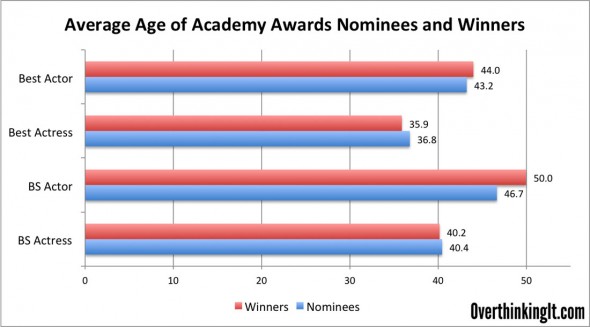
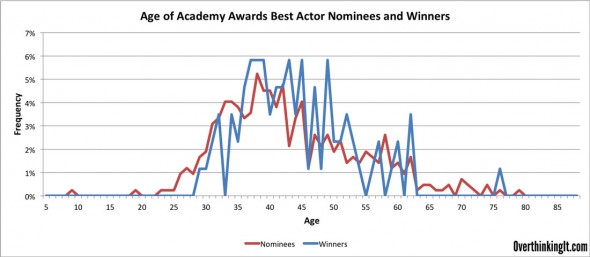
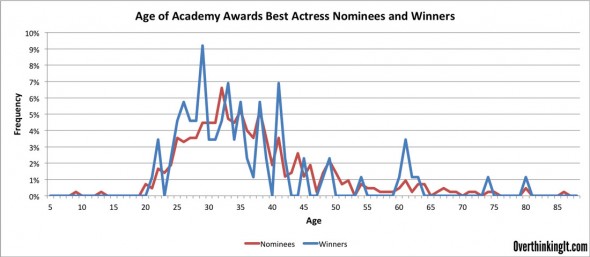
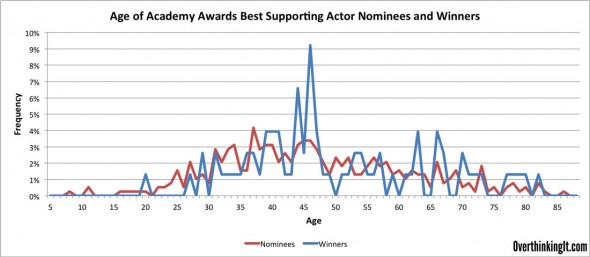
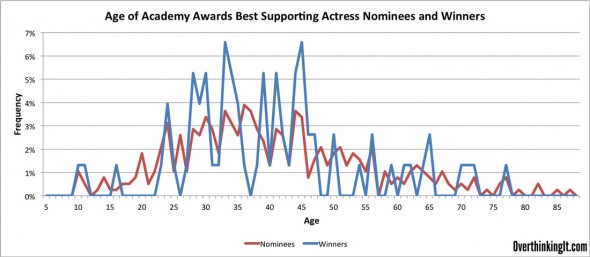
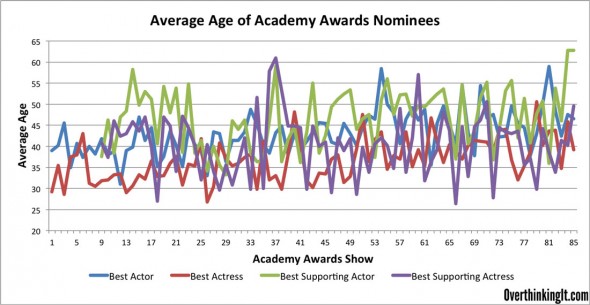
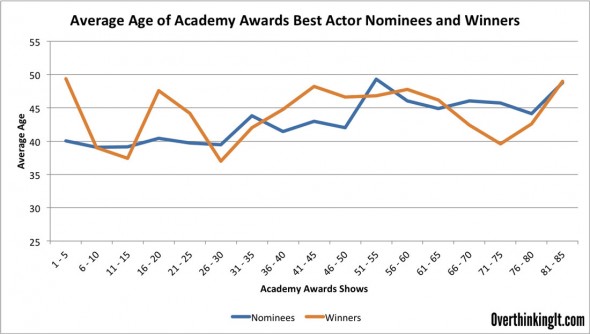
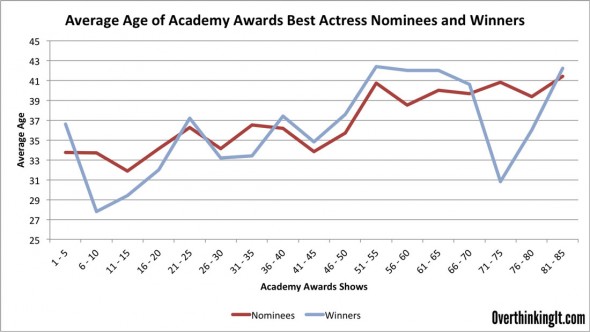
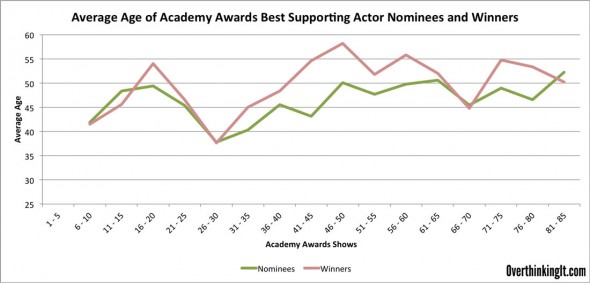
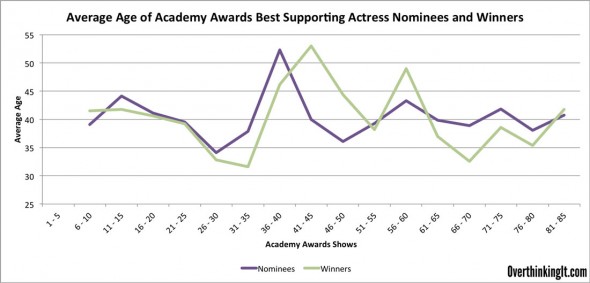
Great analysis, though I think your last point on life expectancy is off. This is an often misunderstood statistic – it helps to keep in mind that the “average” life expectancy number is heavily influenced by infant and child mortality rates. Even in, say, the Middle Ages, those who survived the perilous times of infancy and childhood were likely to live at least into their 60s, despite the overall average life expectancy being much lower.
So anyway, this is true of the 1920-30s as well. Once a typical worker in that time period, say an actor, makes it to, say, age 29, their life expectancy looks much more similar to our own.
That’s a totally legitimate point – it’s not as if everyone in the 1920s expected to die at age 55.
So do you think the “age inflation” we’re seeing in that last set of charts has more to do with actors playing younger characters, or are there better parts for older actors?
Could it be less an age thing and more of just about beauty simply. Maybe the increased age of winners is the result of improved cosmetics and elective surgery and, thus, extending their careers.
Trend toward older and older winners, my intuitive guess is that it’s probably the same the people picking the winners every year, and they’re getting older and older themselves.
I was going to throw in this point as well.
Also should factor in the sort of movies that win Oscars (particularly with ‘Oscar bait’ movies that come out right before Oscar time): what sort of movies are they, and what roles do they provide, so what do they limit about the allowable age of actors?
There’s something interesting in the last group of graphs: a clear dip in Oscars 71-75 with the Best Actor as well as Best Actress winners. So between 1999 and 2003 the Academy must have picked the youngest (or maybe second youngest) nominee. What would that mean?
I was initially surprised to see that the Best Supporting Categories skewed older than the Best Actor/Actress, because, while nobody under the age of 21 has won either of those awards, younger folks have won supporting awards multiple times over, and have more nominations there as well.
I found Best Supporting Actress particularly notable, as Patty Duke winning as a 16-year-old was the end of the Juvenile Oscar they used to give out to folks like Shirley Temple and a young Judy Garland (it was also smaller than actual Oscars) and people like Paquin and Tatum O’Neal have won it when they were very young.
Thus, I have to assume that there are a handful of particularly old nominees, like the old lady from Titanic (I know her name, but Homer Simpson prank called her as “Old Lady From Titanic” and so she shall always be to me), balancing them out to a degree. This sort of makes sense. Especially young and especially old actors are more likely to be in a supporting role, I imagine, because it is less demanding. Then again, this also breaks down a bit because of politicking in terms of which category people are placed in.
Additionally, it’s also possible that part of the reason I was not expecting these numbers is because, while you remember the Paquin’s and the “girl from Whale Rider”‘s of the world as being notable, the dozens of 50-year-olds don’t quite stick out so much. The outliers are skewing my perception, in other words.
Two random thoughts on the age inflation
1. People aren’t just living longer; they are also healthier at older ages. Healthier people can star in more movies.
2. More importantly, the electorate keeps getting older. The Academy has lifetime membership and doesn’t admit many new members which is why the average age voters is well over 60. Older voters may tend to be more sympathetic to older performers.
Nice shout-out in Andrew Sullivan’s Dish.
I hope he comps you with a free subscription to his blog.
Great article! I have often wondered about this myself. I took up your offer to crunch numbers and play with the data set. Across the 4 acting categories I clumped the ages into 5 year ranges. My results are available as a Google spreadsheet at https://docs.google.com/spreadsheet/ccc?key=0Av4h5dE6nWy4dGZMVG9zRTZyeWhzU0ViVGZoOGI4RlE&usp=sharing
The emphasis on age, especially with regards to gender, is the most prominent in the Best Actor/Best Actress category. In both categories, the younger nominees are more likely to win for actresses and the older nominees are more likely to win for actors.